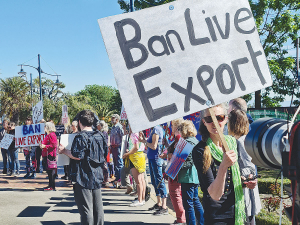Damien O’Connor: NZ united on global trade
When it comes to international trade, politicians from all sides of the aisle are united, says Labour's trade spokesman Damien O'Connor.
 Live exporters believe the Government was swayed more by protestors than industry in its move to soon ban the practice.
Live exporters believe the Government was swayed more by protestors than industry in its move to soon ban the practice.
Labour's 'Rural' MPs have towed the party line and backed Agriculture Minister Damien O'Connor's move to wind-up NZ's $280 million-a-year live export industry.
Both National and ACT rejected the plan to ban the export of live animals.
This follows a divided select committee report on whether the bill should be passed or not. O'Connor drew up the bill to ban live animal export by sea following the sinking of the Gulf Livestock 1 in 2020, which saw the deaths of 41 sailors and 6,000 cattle. It failed to win the full support of Parliament's Primary Production Select Committee.
"The Primary Production Committee has examined the Animal Welfare Amendment Bill," its report said. "The votes were tied, and we were unable to agree on whether the bill should be passed.
However, with the Government's support, it is expected the bill will pass through Parliament - where Labour has an outright majority.
National and ACT registered opposing views to their Labour colleagues over the bill, mainly related to its economic impact.
"It is the view of National Party committee members the projected economic loss caused by such a ban has been grossly underestimated, and that rural communities across New Zealand will be detrimentally affected by both job and revenue loss," they wrote in its dissenting view.
National suggested that the Ministry for Primary Industries (MPI) should instead "take a leadership role in setting and maintaining world-leading compliance standards".
ACT member Mark Cameron agreed, saying New Zealand should develop a "'gold standard' approach for our livestock export industry".
Labour members conceded that there were economic impacts of the legislation, saying the committee was advised "livestock export contributes $261 million to New Zealand's economy annually".
They were also not swayed by the views of submitter who warned the ban could lead to an increase in the annual slaughter of 1.8 million bobby calves, which could be sent overseas.
"The slaughter of bobby calves is wasteful compared to their use as breeding stock overseas," the report says. "Submitters said that the ban could potentially add around 130,000 more."
There were also differing views on whether banning live exports would improve New Zealand's reputation.
In fact, some submitters argued that a ban could be reputationally damaging to NZ.
"Banning livestock export would undermine New Zealand's reputation as a well-managed agricultural economy and transparent trading partner," the report said.
The bill will now go back to Parliament where it is expected to be passed, then the ban would be put in place in April next year.
Budou are being picked now in Bridge Pā, the most intense and exciting time of the year for the Greencollar team – and the harvest of the finest eating grapes is weeks earlier than expected.
The Real Estate Institute of New Zealand (REINZ) has released its latest rural property report, providing a detailed view of New Zealand’s rural real estate market for the 12 months ending December 2025.
Rural retailer Farmlands has released it's latest round of half-year results, labeling it as evidence that its five-year strategy is delivering on financial performance and better value for members.
OPINION: "We are back to where we were a year ago," according to a leading banking analyst in the UK, referring to US president Donald Trump's latest imposition of a global 10% tariff on all exports into the US.
DairyNZ says the Government’s proposed Resource Management Act reform needs further work to ensure it delivers on its intent.
Overseas Trade Minister Todd McClay says he's working constructively with the Labour Party in the hope they will endorse the free trade agreement (FTA) with India when the agreement comes before Parliament for ratification.

OPINION: A mate of yours truly reckons rural Manawatu families are the latest to suffer under what he calls the…
OPINION: If old Winston Peters thinks building trade relations with new nations, such as India, isn't a necessary investment in…